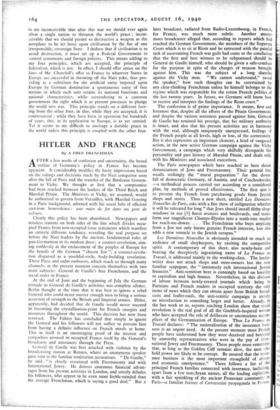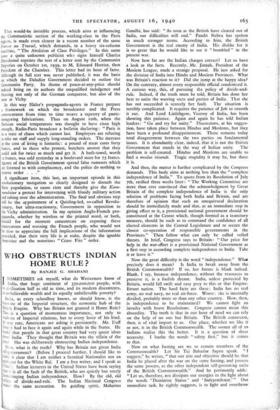HITLER AND FRANCE
By A FREE FRENCHMAN
A FTER a few weeks of confusion and uncertainty, the broad
A
outline of Germany's policy in France has become apparent. It considerably modifies the hasty impressions based on the rulings and decisions made by the Nazi conqueror soon after the fall of Paris and the transfer of the Bordeaux Govern- ment to Vichy. We thought at first that a compromise had been reached between the leaders of the Third Reich and Marshal Petain. The Ministers at Vichy, we assumed, would be authorised to govern from Versailles, with Marshal Goering in a Paris background, adorned with his usual halo of efficient cast-iron benevolence: une main de fer dans un gant de velours.
Clearly this policy has been abandoned. Newspapers and wireless stations on both sides of the line which divides occu- pied France from non-occupied issue statements which manifest an entirely different tendency, revealing the real purpose set before the Nazi leaders by the ancient, fundamental rules of pan-Germanism in its modern dress: a counter-revolution, aim- ing ruthlessly at the enslavement of the peoples of Europe for the benefit of the German " chosen few "; a counter-revolu- tion disguised as a youthful-virile, body-building revolution. These Press and radio outbursts, which reach us through many channels, at the present moment concern themselves with two main subjects : General de Gaulle's free Frenchmen, and the social order in France.
At the end of June and the beginning of July the German attitude to General de Gaulle's activities was complete silence. Berlin thought at the time that it was best to ignore a rebel General who could never muster enough men to bring a serious accretion of strength to the British and Imperial armies. Hitler, apparently, had decided that de Gaulle would never succeed in becoming the crystallisation-point for French energies and resources throughout the world. This decision has now been reversed. The Fiihrer has concluded that simply to ignore the General and his followers will not suffice to prevent him from having a definite influence on French minds at home. This in itself is an encouraging proof of the interest and sympathies aroused in occupied France itself by the General's broadcasts and utterances through the Press.
General de Gaulle was first attacked with violence by the broadcasting station at Rennes, where an anonymous speaker gave vent to the familiar totalitarian accusations. " De Gaulle," he said, " is closely associated with Freemasonry and with International Jewry. He derives enormous financial advan- tages from his present activities in London, and utterly deludes his followers, who appear to be even more feeble-minded than the average Frenchman, which is saying a good deal." But a later broadcast, radiated from Radio-Luxembourg, in French, for France, was much more subtle. Another anony- mous broadcaster alleged that, according to reports which had reached the German Government, the members of the Supreme Court which is to sit at Riom and be entrusted with the painful task of ascertaining French war guilt had come to the conclusion that the first and best witness to be subpoenaed should be General de Gaulle himself, who should be given a safe-conduct for the purpose in spite of the charges of treason brought against him. This was the subject of a long diatribe against the Vichy men. " We cannot understand," raved the speaker," how such thoughts can be entertained by any clear-thinking Frenchman unless he himself belongs to the regime which was responsible for the rotten French politics of the last twenty years. In future, we Germans will know how to receive and interpret the findings of the Riom court."
The confession is of prime importance. It means, first and foremost that, despite all the efforts of the Petain Government, and despite the various sentences passed against him, General de Gaulle has retained his prestige, that his military authority is intact, and also that his present activities are in harmony with the real, although temporarily unexpressed, feelings of the French people at all levels, high or low, of the community. But it also represents an important element, a kind of vanguard action, in the new active German campaign against the Vichy Government, a campaign which very skilfully disregards the personality and past history of Marshal Petain, and deals only with his Ministers and associated executives.
The Paris newspapers which have reached us here shriek denunciations of Jews and Freemasonry. Their general line recalls strikingly the " moral preparation " ,for the down- fall of democratic Germany, of Austria, and of Czechoslovakia —a methodical process carried out according to a considered plan, by methods of proved effectiveness. The first aim is to prevent the French from purchasing goods from Jewish shops and stores. Thus a new sheet, entitled Les Derniares Nouvelles de Paris, asks with a fine show of indignation whether it will be tolerated for long " that Jews should install filthy shop- windows in our [?] finest avenues and boulevards, and trans- form our magnificent Champs-Elysees into a tenth-rate market for reach-me-downs. . . . The Frenchman who buys anything from a Jew not only harms genuine French interests, but also adds a new tentacle to the Jewish octopus," Les Dernieres Nouvelles is obviously intended to reach an audience of small shopkeepers, by exciting the competitive spirit. A contemporary of this sheet, also newly-born and bearing the deceptively ingratiating name of La France an Travail, is addressed mainly to the working-class. The leader- writer does not attack shops and store-owners but the now familiar scapegoat, the " immensely rich international . Jewish financier." Anti-semitism here is cunningly based on hostility to capitalism and high finance. Nevertheless, in this division of labour between newly-created journals which bring to Parisians and French readers in occupied territory the only items of news which they can obtain apart from British broad- casts and leaflet-raids, the anti-semitic campaign is merely an introduction to something larger and better. Already, in the last week or so, reports reaching London show that social revolution is the real goal of all the Goebbels-inspired writers who have accepted the pile of deliberate or unconscious accom- plices of the Germanisation of Europe. Thus La France an Travail declares: " The nationalisation of the insurance busi- ness is an urgent need. At the present moment most French people have understood how they were deceived and betraYed by unworthy representatives who were in the pay of inter" national Jewry and Freemasonry. These people must remember that, as long as the Golden Calf remains alive, the men who hold power are likely to be corrupt. Be assured that the insur- ance business is the most important stronghold of abuse and economic omnipotence." There follows a list of the principal French families connected with insurance, including, apart from a few non-Aryan names, all the leading capitalist': with a fair sprinkling of the ancient Protestant communitY Paris—a familiar feature of Communist propaganda in France- This would-be invisible process, which aims at influencing the Communistic section of the working-class in the Paris region, is made even clearer in a recent number of the same France au Travail, which demands, in a heavy six-column headline, " The Abolition of Class Privileges." In this same issue a quite unknown publicist who signs himself Charles Dieudonne reprints the text of a letter sent by the Communist Deputies on October 1st, 1939, to M. Edouard Herriot, then President of the Chamber. This letter had its hour of fame. Although its full text was never published, it was the basis on which the Daladier Government decided to outlaw the Communist Party. Its theme of peace-at-any-price should indeed bring on its authors the unqualified indulgence and blessing not only of the German conqueror, but also of the men at Vichy.
In this way Hider's propaganda-agents in France prepare a framework on which the broadcaster and the Press commentator from time to time weave a tapestry of panic- mongering fabrications. Thus on August loth, when the Parisian social temperature was thought to have risen high enough, Radio-Paris broadcast a bulletin declaring : " Paris is in a state of chaos which cannot last. Employers are refusing to take on staff and supply long-standing orders. The increase in the cost of living is fantastic: a pound of meat costs forty francs, and to those who protest, butchers answer that they could ask for twice as much and get it. A bath-towel, worth 12 francs, was sold yesterday in a boulevard store for 75 francs. Agents of the British Government spread false rumours which are listened to with complacency, and the police do nothing to restore order . . ."
A significant item, this last, an important episode in this revolutionary instigation so clearly designed to disturb the Paris population, to cause - riots and thereby give the Kom- mandatur a pretext for intervening with bloody military action and taking over the administration. The final and obvious step will be the appointment of a Quisling-led, so-called Revolu- tionary, but ultra-reactionary, Government in opposition to the Vichy administration. In my opinion Anglo-French pro- paganda, whether by wireless or the printed word, or both, should for the moment concentrate on exposing these manoeuvres and warning the French people, who would not be slow to appreciate the full implications of the information provided, that their very life is at stake, despite the ignoble Armistice and the notorious " Cease Fire " order.



























 Previous page
Previous page